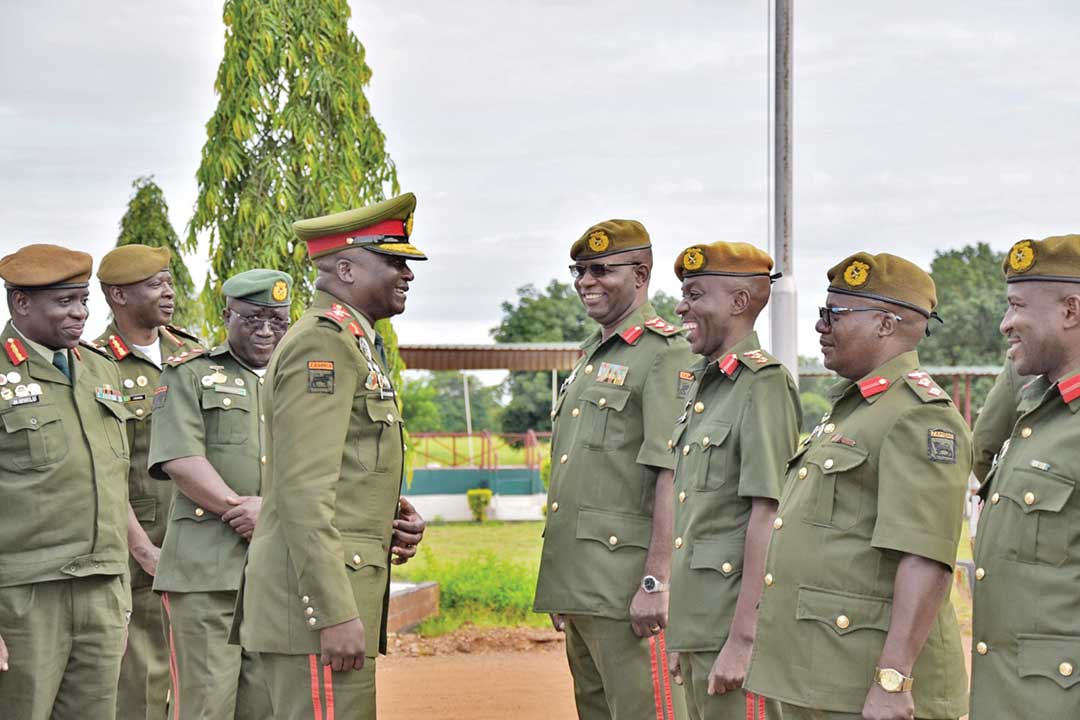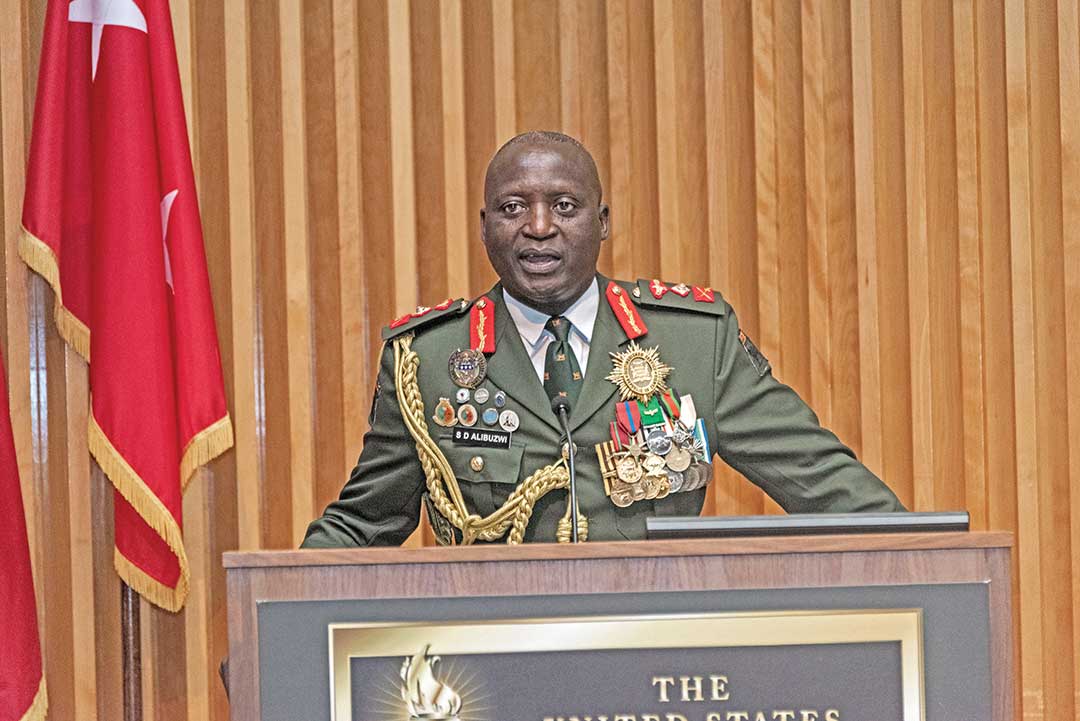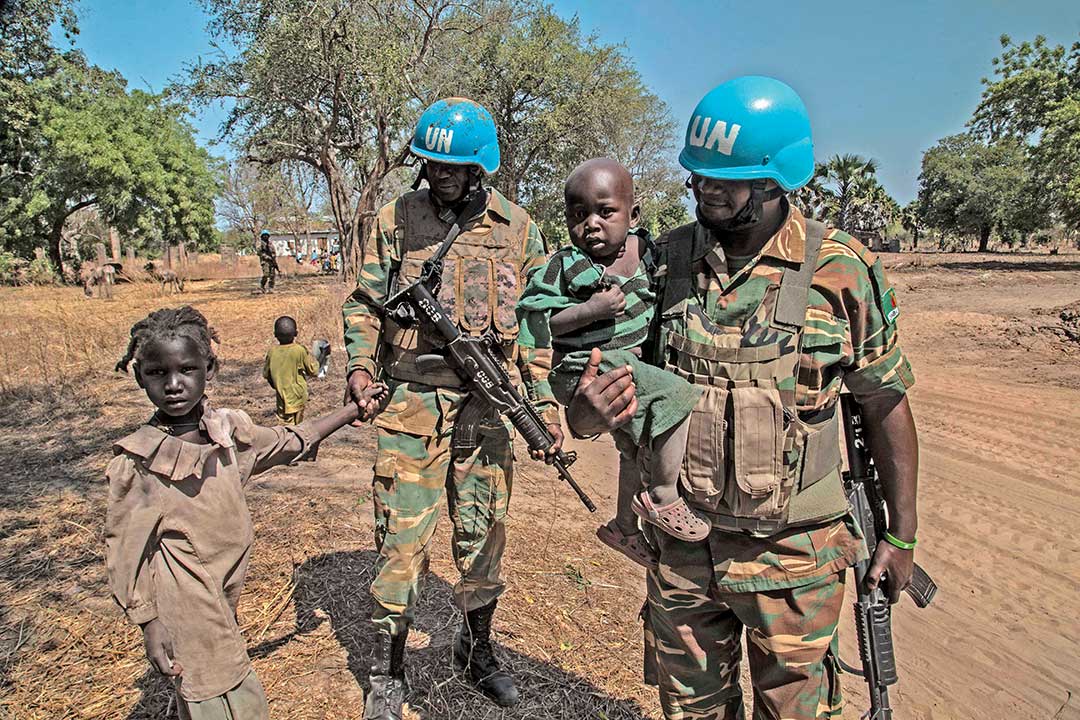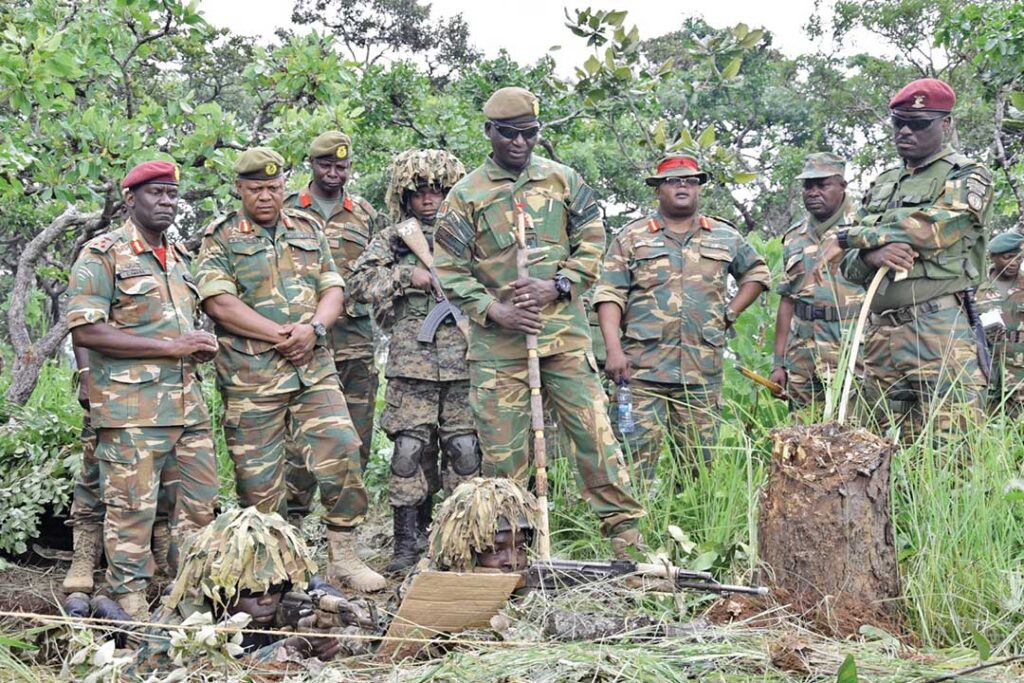Lt. Gen. Dennis Sitali Alibuzwi has served in the Zambia Army for more than 40 years. During his service he has held various command and staff positions. He has served in United Nations peacekeeping missions in Angola, Darfur, Ethiopia/Eritrea and Sierra Leone. In 2019, he was appointed deputy commander of the army, and in 2021 he was appointed army commander. He spoke to ADF from Zambia Army Headquarters in Lusaka. This interview has been edited for space and clarity.
ADF: Zambia has been a major contributor to peacekeeping missions with nearly 1,000 peacekeepers serving in various U.N. missions. Why is this important and how has service abroad helped strengthen the Zambia Defence Force at home?
Alibuzwi: Locally, we are mostly engaged in operations that are around our borders. But there is need for mission experience because it is one of the obligations that we have to fulfill as a member of the U.N. In the deployment missions we grew from strength to strength. When we first deployed in Mozambique, we had our own challenges; we did better in Rwanda, and we have continued to improve in other missions. It brings about that exposure that our Soldiers require. We always start with the pre-deployment training. I used to be very active with preparing troops for deployment when I was a major. The training gives a sense of belonging to those who maintain world peace and also peace in Africa. When you prepare adequately, you find that carrying out duties in the mission is very simple. You are prepared to understand the situation on the ground and win the hearts and minds of the host country. This brings a sense of belonging in the host nation.
ADF: One group that received particular praise is the Zambian Female Engagement Team. Why are they important?
Alibuzwi: When I was in Darfur, I used to have three Zambian police officers –– sisters so to say –– who could go speak to the locals and get their experiences, especially where rape was concerned. Rape was being used as a weapon of war, and women are free to speak to other women to expose what they had gone through. The Zambian contingent started concentrating on a large scale to train women so they could go out in the field and engage with the locals, especially women and children, to get the desired result and also information from the locals.

The Female Engagement Team has proved to be very effective, and we have since requested of the U.N. that we equally have a neutral team called the Engagement Team, because a number of men are victims too, and they are not ready to speak to the Female Engagement Team. We made a module team to engage the males and, so far, the results are very encouraging. For this reason, ZAMBATT, the Zambia Battalion, wherever it is deployed in the Central African Republic, the locals are not ready to have any other contingent, sorry to say. When you are able to get the desired result, it’s very elating that you are contributing to the well-being of the locals.
ADF: Zambia is a country without a significant threat from violent extremism and is at peace with its neighbors. What are the biggest threats faced by Zambia today, and how are you working to address them?
Alibuzwi: I think the threat that is great at the moment is ourselves. Because we lack loyalty in certain instances, and we lack that noble cause to serve our country diligently. We’ve seen the rise in illegal immigrants, and the facilitation has been made by ourselves. So, we are a threat to ourselves because we are not security conscious.
Other than that, what is happening in surrounding countries can also happen to Zambia. Our borders are very wide and porous, but we can do better and stop what the Mozambican brothers and sisters are experiencing and also stop the human trafficking, drug trafficking and other vices, including smuggling minerals out of the country. If all of this is left to grow, it will build up a situation that becomes toxic and dangerous to the security of the nation. We are doing everything possible to address the situation, and we’ve got the goodwill from the President and Commander in Chief, Mr. Hakainde Hichilema, who has promised to adequately fund us and make sure that we train and upgrade ourselves. We are also collaborating with our neighbors in the Southern African Development Community and making sure there is an exchange of intelligence, and we are able to address many challenges as a regional group.
ADF: Zambia faces the threat of natural disasters such as floods and cyclones. How is the Zambia Army working to improve disaster preparedness and its capacity to respond?

U.S. ARMY WAR COLLEGE
Alibuzwi: We have the Disaster Management and Mitigation Unit. At the moment it’s the prime mover for such disasters and challenges. But we do train for disasters. We are reequipping to meet all sorts of disasters under the umbrella of the Central Joint Operations Committee, which carries out the functions of a unified all-of-government approach to dealing with situations like disasters. There is a committee that always meets that looks at how to stock, when to stock, where and why, so as to prepare ourselves as we are given the weather alert from our meteorological department. As an army we are prepared for anything. We prepare for the worst-case scenario.
ADF: When you were appointed Zambia Army Commander in 2021, President Hichilema said the military “must have the interest of the people at heart and serve the country diligently.” How did you interpret this mission, and how have you tried to improve civil-military relations in the country?
Alibuzwi: I’m passionate about this question because I’ve been teaching the need to be loyal from the time when I was a second lieutenant. I was given the chance to start at the training school; at that time it was called the Military School of Learning. I start from the base of how we joined the army. Zambia is a Christian nation; as we are joining and as we are being enlisted, we hold the Bible in the right hand to take the oath of allegiance. When taking the oath of allegiance, we say that, “I will protect the president of the Republic of Zambia, I will preserve the Constitution of the Republic of Zambia, I will protect the citizens of Zambia, and I will carry out my duties dutifully and diligently.” This oath of allegiance is about being subservient to the civil authority under the representation of the president himself. He’s the one who gives us orders and instructions through the Defense Act. So, I’m a servant of Zambia, I’m a servant of the president, I’m a servant of the authorities that steer ahead the direction of this country. With this understanding, therefore, one cannot do anything outside of that which is directed to him by the commander-in-chief of the Defence Force. I try very hard to maintain discipline within the rank and file. I try very hard to make everyone see the sense in the saying that “ours is to obey orders promptly and obediently carry out tasks.” We are the last defense of this nation, and we cannot afford not to follow orders, not to follow directions, because ours is to perform duties as directed by the president. So, it’s very simple: You are able to follow if you know where you’re coming from.
ADF: Are there any strategic communications tools you use to improve civil-military relations?
Alibuzwi: We have opened up for people to know who we are. We’ve got a Facebook page and an army website where we post matters that help us relate with the population to know what this army is all about and who they interact with when we go out in public, and they see us in uniform. The population is well informed about what the army is all about. The same applies to the air force, Zambian National Service and Zambian Police. This is why we have strategic communication to the population so that they have trust in us and are confident that we are there to defend them. We would not be in uniform if it wasn’t for them. We do so proudly, and they should know this is the people’s army. We are also using sports as one field to convey who we are. The army has female footballers, and a good number of them are representing the country at the World Cup.
ADF: Why do you think coups are occurring so regularly in Africa after decades in which they were on the decline?

Alibuzwi: I do not want to speak on behalf of those who are going outside their mandate as prescribed in military law to take over governments. What I want to emphasize is that here, starting with basic training for all Soldiers including officers, we emphasize the need to uphold the law. We also recognize the fact that we are not the ones to correct the wrongs. Ours is to protect the constitution, obey the government of the day and maintain the peace of this nation. Therefore, we make it very clear that, in our minds, there is no time that we should think of taking over government, because that is not our field. The training of our men and women in uniform is tailored toward doing what the law provides for and not what is outside the law. We’ve managed to keep this in line and in check, and our Soldiers are professionals. Maybe a few elements will entertain such thoughts but once discovered we quickly get rid of them, so they leave this noble uniform.
ADF: Early this year you were inducted into the International Fellows Hall of Fame at the U.S. Army War College, which you attended in 2013. What did this mean to you?
Alibuzwi: Being recognized at the highest level is one great achievement. It doesn’t come in that manner to many. I would say it’s a lifetime achievement, but it came through hard work, it came through remaining loyal to the government of the day, it came through focus of looking at what that course meant and what I wanted to achieve from it. From the course, I came back, and I was able to magnify my approaches to teaching. I came back and returned to my appointment as chief instructor at our Command and Staff College. So, I shared that experience where I had upgraded my understanding of certain military concepts. Above all, I’m at the peak of my career; the next step is retirement. So, being honored brings gratification that, yes, one led a very good military life.
ADF: As you look ahead to the future, what are your goals for the Zambia Army?
Alibuzwi: I would have loved to do a lot of programs, but we are coming out of a very challenging economy. Resources have competing needs. Therefore, I don’t really get that which I want to carry out the modification of the army in a time frame that I think is adequate. However, I am focused on growing the army to be able to defend this nation adequately, to be able to have the correct and modern equipment for that matter. Slowly but surely, I will continue knocking on the doors of the commander-in-chief and the other government institutions to make sure the army is given the attention it requires to be professional and modern.

